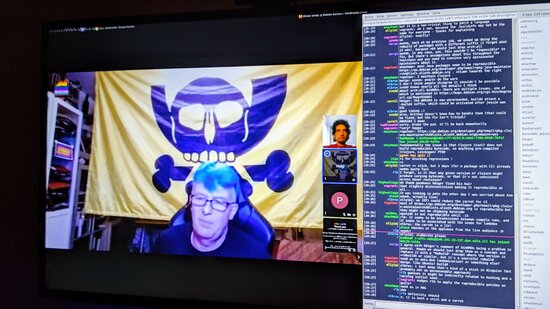Russell Coker: Source Code With Emoji
The XKCD comic Code Quality [1] inspired me to test out emoji in source. I really should have done this years ago when that XKCD was first published.
The following code compiles in gcc and runs in the way that anyone who wants to write such code would want it to run. The hover text in the XKCD comic is correct. You could have a style guide for such programming, store error messages in the doctor and nurse emoji for example.
#include <stdio.h>
int main()
int = 1, = 2;
printf(" =%d, =%d\n", , );
return 0;
To get this to display correctly in Debian you need to install the fonts-noto-color-emoji package (used by the KDE emoji picker that runs when you press Windows-. among other things) and restart programs that use emoji. The Konsole terminal emulator will probably need it s profile settings changed to work with this if you ran Konsole before installing fonts-noto-color-emoji. The Kitty terminal emulator works if you restart it after installing fonts-noto-color-emoji.
This web page gives a list of HTML codes for emoji [2]. If I start writing real code with emoji variable names then I ll have to update my source to HTML conversion script (which handles <>" and repeated spaces) to convert emoji.
I spent a couple of hours on this and I think it s worth it. I have filed several Debian bug reports about improvements needed to issues related to emoji.


































 The following contributors got their Debian Developer accounts in the last two months:
The following contributors got their Debian Developer accounts in the last two months:








 The Python programming language is one of the most popular and in huge demand. It is free, has a large community, is intended for the development of projects of varying complexity, is easy to learn, and opens up great opportunities for programmers. To work comfortably with it, you need special Python tools, which are able to simplify your work. We have selected the best Python tools that will be relevant in 2021.
The Python programming language is one of the most popular and in huge demand. It is free, has a large community, is intended for the development of projects of varying complexity, is easy to learn, and opens up great opportunities for programmers. To work comfortably with it, you need special Python tools, which are able to simplify your work. We have selected the best Python tools that will be relevant in 2021. I started to write C 25 years ago now, with many different tools over the year. As many open source developers, I spent most of my life working with the GNU tools out there.As I've been using an Apple computer over the last years, I had to adapt to this environment and learn the tricks of the trade. Here are some of my notes so a search engine can index them and I'll be able to find them later.
I started to write C 25 years ago now, with many different tools over the year. As many open source developers, I spent most of my life working with the GNU tools out there.As I've been using an Apple computer over the last years, I had to adapt to this environment and learn the tricks of the trade. Here are some of my notes so a search engine can index them and I'll be able to find them later. Fifteen years have passed since I started my career in IT which is quite some time. I've been playing with computers for 25 years now, which makes me quite knowledgeable about the field, for sure.However, while I was fully prepared to bargain with computers, I was not prepared to do so with humans. The whole career management thing was unknown to me. I had no useful skills to navigate within the enterprise organization. I had to learn the ropes the hard way, failing along the way. It hurt.Almost ten years ago, I had the chance to meet a new colleague Alexis Monville. Alexis was a team facilitator, and I started to work with him on many non-technical levels. He taught me a lot about agility and team organization. Working on this set of new skills changed how I envisioned my work and how I fit into the company.
Fifteen years have passed since I started my career in IT which is quite some time. I've been playing with computers for 25 years now, which makes me quite knowledgeable about the field, for sure.However, while I was fully prepared to bargain with computers, I was not prepared to do so with humans. The whole career management thing was unknown to me. I had no useful skills to navigate within the enterprise organization. I had to learn the ropes the hard way, failing along the way. It hurt.Almost ten years ago, I had the chance to meet a new colleague Alexis Monville. Alexis was a team facilitator, and I started to work with him on many non-technical levels. He taught me a lot about agility and team organization. Working on this set of new skills changed how I envisioned my work and how I fit into the company. Alexis Monville
Alexis Monville The book!
The book!











